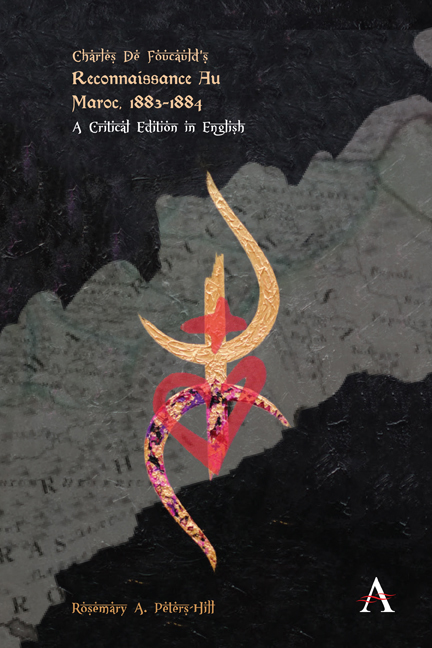Book contents
- Frontmatter
- Contents
- List of Figures
- Acknowledgments
- “There are no roads”: Charles de Foucauld’s Reconnaissance au Maroc—a Critical Introduction
- Charles de Foucauld, Reconnaissance au Maroc, 1883–1884
- Letter to François de Bondy
- Introduction
- Avant-Propos
- I Tangiers to Meknès
- II Meknès to Qaçba Beni Mellal
- III Qaçba Beni Mellal to Tikirt
- IV Tikirt to Tissint
- V Sojourn in the Sahara
- VI Tissint to Mogador
- VII Mogador to Tissint
- VIII Tissint to the Dadès
- IX The Dadès to Qçabi ech Cheurfa
- X Qçabi ech Chorfa to Lalla Maghnia
- Appendix: The Jews of Morocco
- Note on the Materials Used to Draw Up My Itinerary
- Report Delivered to the Société de Géographie de Paris in Its General Session of 24 April 1885
- “Itineraries in Morocco”
- Afterwards: An Afterword
- Glossary of Terms
- Bibliography
- Index
VI - Tissint to Mogador
Published online by Cambridge University Press: 20 January 2022
- Frontmatter
- Contents
- List of Figures
- Acknowledgments
- “There are no roads”: Charles de Foucauld’s Reconnaissance au Maroc—a Critical Introduction
- Charles de Foucauld, Reconnaissance au Maroc, 1883–1884
- Letter to François de Bondy
- Introduction
- Avant-Propos
- I Tangiers to Meknès
- II Meknès to Qaçba Beni Mellal
- III Qaçba Beni Mellal to Tikirt
- IV Tikirt to Tissint
- V Sojourn in the Sahara
- VI Tissint to Mogador
- VII Mogador to Tissint
- VIII Tissint to the Dadès
- IX The Dadès to Qçabi ech Cheurfa
- X Qçabi ech Chorfa to Lalla Maghnia
- Appendix: The Jews of Morocco
- Note on the Materials Used to Draw Up My Itinerary
- Report Delivered to the Société de Géographie de Paris in Its General Session of 24 April 1885
- “Itineraries in Morocco”
- Afterwards: An Afterword
- Glossary of Terms
- Bibliography
- Index
Summary
Tissint to Afikourahen
Back in Tissint, I found that the money I had with me, through a series of successive thefts, had diminished to such a point that I could not finish my travels with what I had left. Before anything else, I had to procure more finances. I would only be able to do so in a city where there were Europeans: the nearest of these was Mogador. I resolved to go seek out funds in that port.
I spoke of my project with my friend the Hajji, and with him made the following arrangement: he would take me to Mogador, wait for me there, and bring me back to Tissint; we would take different roads going and returning, traveling the first time through the Isaffen and Ilalen tribes, and the second time through the Souss, the Ras el Oued and the Aït Jellal tribe. Hajji Bou Rhim knew the region we were to cross on our return and had many friends there; for our outbound journey, he would bring along one of his agents, named Mohammed ou Addi, a man from the Ilalen tribe, who had many times traveled along the road we were to take. We would leave with just the three of us: the rabbi Mardochée, who I did not need, would remain in Tissint in the Hajji's home, and await my return.
9 January. I left Tissint on 9 January, at ten-thirty in the evening, and headed toward Tatta escorted by the Hajji and his companion. We traveled all night. We had waited to leave until the qçar was sleeping: nobody knew of our trip; even, leaving, the Hajji did not bid goodbye to his wives or children. If rumor of our departure had come out, we would have had to fear foreigners—Berâber, Oulad Iahia or others, always present in large numbers in Agadir— lying in ambush to attack and pillage us. Thus our furtive departure and nocturnal travel. The rabbi Mardochée had orders to open the house to no one the following day and, after two days, to declare that we had left for Tazenakht.
- Type
- Chapter
- Information
- Charles de Foucauld’s Reconnaissance au Maroc, 1883–1884A Critical Edition in English, pp. 289 - 304Publisher: Anthem PressPrint publication year: 2020



